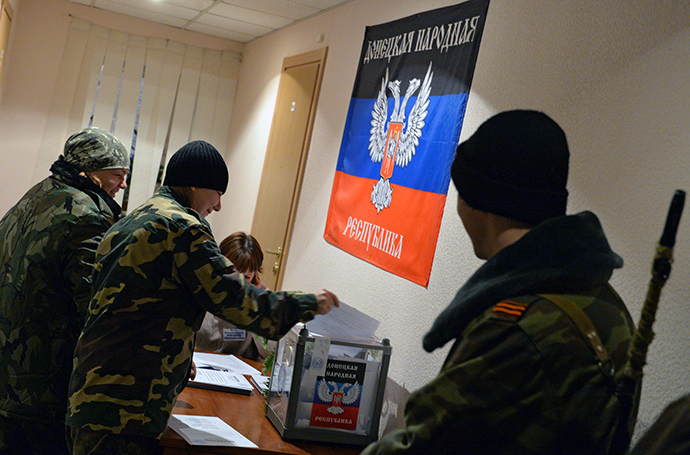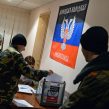
Russian Hybrid War, Euro-Hybrid Democracy in Ukraine’s East (Part One)
Publication: Eurasia Daily Monitor Volume: 12 Issue: 183
By:

Moscow has instructed the Donetsk and Luhansk “people’s republics” (DPR-LPR) to postpone the local “elections” that were scheduled for October 18 and November 1 in that Russian-controlled territory of Ukraine. Those elections would have been staged separately from Ukraine’s own local elections, which are scheduled to be held country-wide on October 25.
Germany and France (negotiating with Russia over Ukraine in the “Normandy” forum) are expressing relief over the Kremlin’s seemingly constructive move to postpone the DPR-LPR’s unilateral elections (Deutsche Welle, Agence France Presse, October 7).
Berlin and Paris were aghast at the possibility that the DPR-LPR would hold elections that could not have been recognized as valid. Russia, Germany and France basically agree on a solution that legitimizes the DPR-LPR as products of democratic elections, not of Russia’s military aggression; this leaves the territory formally within Ukraine but de facto under the Kremlin’s control. Any unlawful, unilaterally held, and therefore invalid elections would not only be useless to those three “Normandy” powers, but would block or derail the follow-up steps planned to “implement Minsk” in quick sequence (see below).
The DPR-LPR do not on their own decide whether to call elections or not. Moscow was behind the DPR-LPR’s bluff to derail the international negotiations through their illegal elections. Blaming Kyiv for its refusal to legalize those elections, they threatened to stage the voting unilaterally. That was calculated to make Berlin and Paris nervous and generate pressures from them on Kyiv to relent. It worked as intended, despite the obviousness of the bluff. Staging deal-breaking elections would have contravened Moscow’s main goal at this stage—that of legitimizing the DPR-LPR. Moscow’s “threat” to shoot itself (and its proxies) in the foot was not credible; but it played on German and French impatience to de-prioritize “the Ukraine crisis,” address the European Union’s own internal and external crises, and rebuild relations with Russia.
Those unilateral “elections” would have relieved Ukraine of the Minsk armistice provisions to negotiate with the DPR-LPR and legitimize them. The deadline for implementing those political provisions expires in December. Unilateral elections would have voided that part of the Minsk armistice beyond repair. Germany and France, however, are eager to declare the political terms of the Minsk Two armistice as fulfilled (at Ukraine’s expense), the conflict as “politically solved” (even if merely frozen) and—in that case—the main package of economic sanctions on Russia as no longer warranted.
Moscow, Berlin and Paris all need—albeit for differing reasons—to declare the DPR-LPR elections (at the very least) as legal and (if possible) as reasonably free, fair and democratic. The Normandy forum’s summit, held in Paris, on October 2, mapped out a sequence of steps toward that end. Russian President Vladimir Putin, German Chancellor Angela Merkel, and French President Francois Hollande jointly prevailed on Ukrainian President Petro Poroshenko to accept those steps.
These include adopting a special election law by agreement with the DPR-LPR, as a basis for elections in that territory, different from Ukraine’s electoral legislation, and avowedly outside Ukraine’s framework of constitutional guarantees; completing the enactment of an amnesty law, with immunity to DPR-LPR election candidates suspected of crimes; and completing the enactment of the constitutional status of the Donetsk-Luhansk territory ahead of the local elections to be held there.
The items in this package are “framework” understandings; in other words, the details remain subject to further negotiation in the Minsk Contact Group—made up of representatives of Ukraine, Russia, the Organization for Security and Cooperation in Europe (OSCE), as well as DPR and LPR). Moreover, Poroshenko made clear in Paris that the passage of such legislation through the Ukrainian parliament cannot be guaranteed (Elysee.fr, Bundeskanzlerin.de, Liga.net, October 3; Interfax, October 6).
Holding and validating DPR-LPR’s elections can only be done with Kyiv’s formal (and no matter how unwilling) consent. This would preserve a legal facade of Ukraine’s territorial integrity while depriving it of actual sovereignty in that territory. “Elections” behind that facade would then enable Moscow, Berlin and Paris to pressure Kyiv into recognizing the authorities of those two “people’s republics” as legitimately elected. And that would, in turn, exonerate Russia of its legal, political, and economic responsibilities for its de facto occupation of Ukraine’s territory. Kyiv, therefore, is desperately trying to stall (or wiggle out of) this scheme in the Normandy forum and the Minsk Contact Group.
“Fake elections” (as Ukraine refers to that plan) in the two “people’s republics” must at least look free and fair. Those elections constitute the mechanism by which DPR-LPR authorities would obtain a legal status and recognition while Ukraine would retain sovereignty de jure but lose it de facto in this territory. At the same time, Russia would be cleared of the stigma of military aggression and occupation, even as Russian forces stay on.
Moscow, Berlin and Paris have now agreed in the Normandy forum that local elections are to be staged and validated in the early months of 2016 in the DPR-LPR. This would allow the OSCE’s election-monitoring agency—the Office of Democratic Institutions and Human Rights (ODIHR)—a decent interval to prepare the cosmetics of DPR-LPR elections. Russia, Germany and France expect ODIHR to prepare that electoral process, with a view to validating its political outcome. This expectation was expressed plainly at the Normandy forum’s October 2 summit in Paris (see above).
Under the Minsk armistice, Russia has no obligations to withdraw its forces from the DPR-LPR, and the two “people’s republics” are not compelled to disarm. The Western powers (including Germany and France) will almost certainly raise those issues only after the DPR-LPR “elections,” this being the sequence envisaged in the Minsk armistice. But those military clauses are vague, nonbinding, and lacking any deadlines. Thus, DPR-LPR elections would be staged in the presence of Russian troops and security services, in the absence of the rule of law, and (conversely) amid regimentation of the authorities’ supporters. In Washington and in the OSCE, the Barack Obama administration seems unconcerned with such elections being planned, which are somewhat reminiscent of East-Central Europe during 1945–1948.
In Donetsk and Luhansk, meanwhile, Russia’s hybrid war would find a correspondingly modern corollary, in the form of hybrid elections and a hybrid legality, themselves the expressions of Western diplomatic compromises with the Kremlin.




